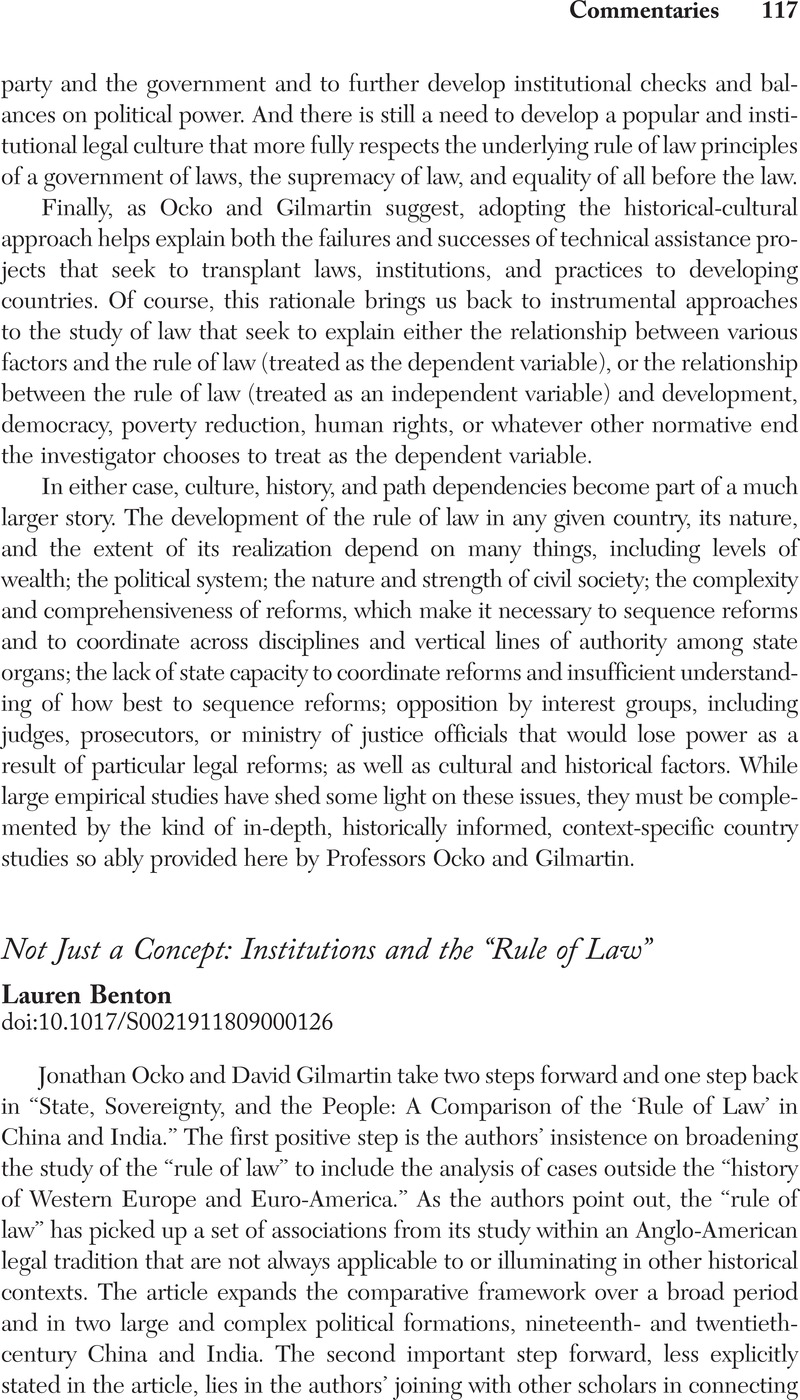Article contents
Not Just a Concept: Institutions and the “Rule of Law”
Published online by Cambridge University Press: 27 January 2009
Abstract

- Type
- Commentaries
- Information
- Copyright
- Copyright © The Association for Asian Studies, Inc. 2009
References
1 Kahn, Paul W., “Freedom, Autonomy, and the Cultural Study of Law,” in Cultural Analysis, Cultural Studies, and the Law: Moving Beyond Legal Realism, ed. Sarat, Austin and Simon, Jonathan (Durham, N.C.: Duke University Press, 2003), 167Google Scholar.
2 Kahn, “Freedom, Autonomy, and the Cultural Study of Law,” 167, 170.
3 Benton, Lauren, Law and Colonial Cultural Cultures: Legal Regimes in World History (Cambridge: Cambridge University Press, 2002), chap. 4Google Scholar; and Travers, Robert, Ideology and Empire in Eighteenth-Century India: The British in Bengal (Cambridge: Cambridge University Press, 2007)CrossRefGoogle Scholar.
4 Travers, Ideology and Empire in Eighteenth-Century India, 23–24.
5 Marshall, Peter, The Making and Unmaking of Empires: Britain, India, and America c. 1750–1783 (Oxford: Oxford University Press, 2005), 378Google Scholar.
6 Pitts, Jennifer, A Turn to Empire: The Rise of Imperial Liberalism in Britain and France (Princeton, N.J.: Princeton University Press, 2005), 59CrossRefGoogle Scholar.
7 Mantena, Karuna, “‘Law and Tradition’: Henry Maine and the Theoretical Origins of Indirect Rule,” in Law and History, ed. Lewis, Andrew and Lobban, Michael (Oxford: Oxford University Press, 2004), 182Google Scholar.
8 See Keene, Edward, Beyond the Anarchical Society: Grotius, Colonialism and Order in World Politics (Cambridge: Cambridge University Press, 2002)CrossRefGoogle Scholar; and Benton, Lauren, “From International Law to Imperial Constitutions: The Problem of Quasi-Sovereignty, 1870–1900,” Law and History Review 26, no. 3 (forthcoming, 2008)CrossRefGoogle Scholar.
9 See Anghie, Antony, Imperialism, Sovereignty and the Making of International Law (Cambridge: Cambridge University Press, 2005)CrossRefGoogle Scholar.
10 Stoler, Ann L., “On Degrees of Imperial Sovereignty,” Public Culture 18 (2006): 125–46CrossRefGoogle Scholar; Benton, Lauren, “Empires of Exception: History, Law, and the Problem of Imperial Sovereignty,” Quaderni di Relazioni Internazionali, December 2007, 54–67Google Scholar; cf. Neuman, Gerald, “Surveying Law and Borders: Anomalous Zones,” Stanford Law Review 48:1197Google Scholar; and see Benton, , “Constitutions and Empires,” Law and Social Inquiry 31 (1006: 1): 177–98CrossRefGoogle Scholar.
11 Burbank, Jane, Russian Peasants Go to Court: Legal Culture in the Countryside, 1905–1917 (Bloomington: Indiana University Press, 2004)Google Scholar.
12 Burbank, Russian Peasants Go to Court, 264.
13 Burbank, Russian Peasants Go to Court, 44.
- 3
- Cited by




